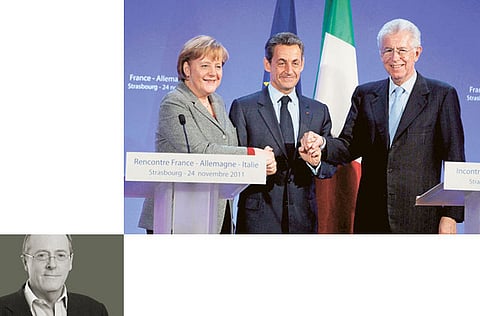Another Sarkozy term?
The question remains whether the incumbent president will be able to convince the French that there is no serious alternative to him

The European economic crisis has been rumbling on for the last few months under the watchful eye of the US, which incidentally has been the main nation responsible for it since its banking sector collapsed in 2008.
French President Nicolas Sarkozy and German Chancellor Angela Merkel spend most of their time “saving the world”.
The next “save the world exercise” is scheduled in Brussels for December 8 and the situation is likely to continue until the Germans realise they are the true beneficiaries of the euro, and they’d better do what is necessary to protect it.
But they are terrified by historical reminiscences — see their debilitating position with regard to the Israeli occupation of Palestine. The souvenir of the 1930s inflation is the very root of their opposition to the European Central Bank playing its role as a ‘lender of last resort’: that is, buying sovereign debts of member-states in order to guarantee their solvency. They will accept it only if Sarkozy keeps to his promises to support better European governance based on a control of national budgets and fiscal harmonisation.
Meanwhile, financial markets are being frightened by a Euro- zone which is further weakened by destabilising rumours coming from the US.
Saving the world every passing day seems to be a rather good political coup for Sarkozy. He is not yet seeking a second term, officially. He just travels three times a week in the countryside to meet the people and explain his achievements.
For sure, the G20 Summit and side discussions with Greece and Italy boosted his campaign. Whilst serious doubts existed three months ago as to his capacity to run for re-election, he has now come back, opinion polls show, to possibly winning levels: 28 per cent against 32 per cent for his main challenger, socialist candidate Francois Hollande, in the first round.
Sarkozy may have not been a good president — opinions are naturally conflicting. But everyone agrees he is a fantastic candidate. Actually, he is a typical politician who makes promises, feels the situation — if not the people, and who is smart enough to build around him a team of intellectually half-deficient people, so that he can easily appear smarter than them.
Opinion polls show that people don’t like him. His style, biased reasoning and missed commitments don’t please. Yet, it is not enough reason not to vote for him; especially if apparent dynamism and vibrant capacity of reaction are able to make place for fundamental debates — which are simply by-passed. Who for instance will take time to explain to the people how states can reimburse a public debt with a negative growth and no possible fluctuation of currency?
But another reason why people are ready to vote for him is the choice which is offered. Socialist challenger Hollande, indeed, has already deceived many possible supporters, even though he still enjoys a comfortable lead. A man coming into the picture from far, he won the socialist contest against most of the party’s governing structure (the so-called ‘elephants’). Some believed he had endorsed the vest of a genuine statesman, to which added an easy manner with the people and a simple attitude – “I’m a normal guy”, he said, whilst moving in the streets of Paris on his motorbike. In other words, he was everything needed by a vast majority of French after Sarkozy.
But Hollande has friends and these have become Sarkozy’s best allies. On the one hand, a populist far-left and socialist senator compared Hollande’s reaction to the crisis last week, to the one of a ‘pedalo captain’. The Greens, on the other hand, were able to sell their support through a party agreement whereby they will benefit by 60 possible seats in the next parliamentary election. The deal caused uproar. First, such cosy arrangements have little to do with a French presidential election concept, which is when a man or a woman meets the country. Holland did not need that and he weakened his standing doing so. Worse, the agreement included a decision to start giving up the French nuclear industry — a particularly stupid decision after the disasters met by countries preferring to save money and buy garbage, instead of insisting on safety.
It being said, the continuing arrogant style of pro-Sarkozy’s press could still prove fatal and a majority of French remains hostile to him (opinion polls still credit Hollande with 58 per cent versus 42 per cent in the second run). Ahead of followers such as far-right leader Marine Le Pen (around 18 per cent) or centre candidate Francois Bayrou (8-10 per cent), the question for Sarkozy remains is whether he will be able to convince the French that, whether they like him or not, there is no serious alternative to him.
French presidential elections’ results can hardly be predicted more than three months before the elections. There is thus still time to go but one thing is for sure, the campaign has started with a bang. And it sure does not smell of French perfume.
Luc Debieuvre is a French essayist and a lecturer at IRIS (Institut de Relations Internationales et Stratégiques) and the “FACO” Law University of Paris.
Sign up for the Daily Briefing
Get the latest news and updates straight to your inbox


